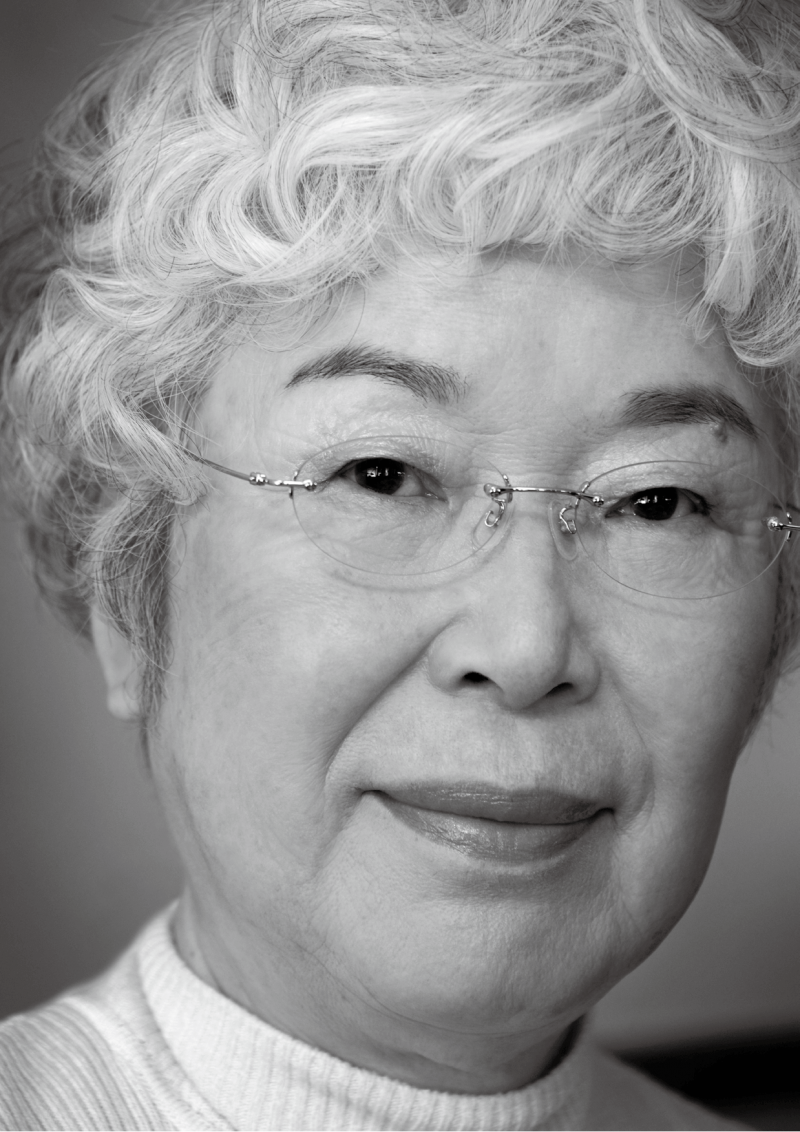Issue:

“It was after the war that I first encountered the crude form of suppressing independent thinking by censoring what is uncomfortable to those in power,” says Haruko Watanabe. “At elementary school, some of our teachers told us to ink out parts of the textbooks they considered to be harmful. It was the first time my heart wanted to rebel against attempts to suppress facts.”
This was how a deep love for conveying the message without distortion was implanted, something she’s nurtured throughout her career in journalism.
Haruko was born in an intellectual family of Kyoto, surrounded by the books that her grandfather, a university professor, collected at their ancestral home. The intellectual atmosphere that she was exposed to at a very early stage also made her aware of the importance of independent thinking: a virtue that she considers to be fundamental for any one seeking to become a journalist.
‘SOME OF OUR TEACHERS TOLD US TO INK OUT PARTS OF THE TEXTBOOKS THEY CONSIDERED TO BE HARMFUL. IT WAS THE FIRST TIME MY HEART WANTED TO REBEL AGAINST ATTEMPTS TO SUPPRESS FACTS.’
She was a student of Doshisha University when another series of events rocked Japan the mass movement against the revision of the Japan-U.S. security treaty. “Professors at our university were urging us to join the movement,” Haruko recalls, “and the press sided mostly with the protesters. But after the New York Times criticized the movement, calling it a student riot, the position of the Japanese press changed abruptly. What infuriated me was the changing position of leading Japanese newspapers, which at the beginning inspired students to join the ranks of protesters and then started branding them as rock throwing rioters.”
She was among a few Doshisha students who dared raise their voices against the intellectuals and, considering her independent spirit, one of her professors suggested that she pursue a higher education in journalism in the U.S. She began graduate studies at the School of Journalism at University of Missouri, and became more involved with mainstream Japanese journalism, contributing regularly to Mainichi Shimbun with featured stories focusing on the realities of American life.
It was also in Missouri that she met her life partner, Yuji, who at the time was a research scholar at the Illinois Institute of Technology. According to Haruko, “it was not just love at first sight. He even proposed at that first meeting. Somehow I was convinced by his sincerity that he would allow me to continue my professional career after marriage.” The couple tied the knot. Soon after he was recruited by Sony.
A big change came when her husband was assigned to Sony’s New York office, as Haruko accompanied him with the aim of pursuing her career in journalism. “I enrolled as a graduate student at the Columbia School of Journalism and took an assignment from the New York Board of Education to make a series of educational videos,” she says. That assignment marked a permanent shift from the print form to the electronic one, leading her to become a pioneer not only for Japanese women pursuing this difficult career, but for women around the world.
Encouraged by her success in the New York educational community, she established her own non profit video production and media research institution, HKW, in New York in 1972. Says Haruko, “HKW made its first breakthrough in 1975, the year that was designated by the United Nations as International Women’s Year. I got actively involved in producing videos focusing on the plight of women in Japan and Asian countries.”
From then on, Haruko could be seen lugging around heavy video equipment to conferences and international gatherings focusing on women’s issues. One of those was the 1980 Copenhagen World Conference of Women, and the resulting production “was made by an all female crew under my supervision.”
The Copenhagen conference led to a long association with UNESCO and other international and regional bodies, like the Manila based Press Foundation of Asia, for which she served as Tokyo Bureau Chief until 2000. As a UNESCO consultant, Haruko also worked to train women broadcasters in developing countries in Asia and Africa, an assignment that she still feels proud of.
Today, Haruko keeps herself busy not only as a media consultant, but also as a regular contributor to Media Report to Women and as a columnist for Rosetta Stone Magazine. She is also invited regularly to speak at seminars for women students who would like to start a career in journalism. As for the FCCJ, she has never hesitated to spare her valuable time for the benefit of the Club. As a Regular Member since 1981, Haruko served in various Board positions and has chaired most of the committees during her long career. One of her significant contributions is the Special Project Committee that she was instrumental in establishing.
Haruko is quite frank in suggesting that her path to success was paved by the supporting hands of all her male associates. As she says, “Being a woman born in Japan at a time when there were still many taboos surrounding the role of women in society, I achieved what I did mostly due to the support of male decision makers, professionals and other helping hands. This started right at home with my husband, who all along was supportive and cooperative. I’m thankful to all of them.”
The mother of two adult daughters and the grandmother of five, Haruko feels it is still a bit early for her to think about total retirement. The Club, for one, is the better for it.
Monzurul Huq represents the largest circulation Bangladeshi national daily, Prothom Alo. He was FCCJ president from 2009 to 2010.

